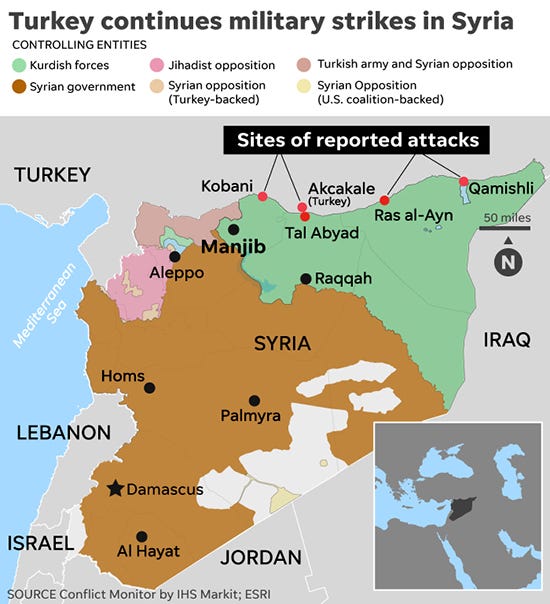Turkish strikes hit civilians as Syria offensive intensifies
 Kim Hjelmgaard
Kim HjelmgaardTurkey's military stepped up airstrikes and a ground offensive into Kurdish-held parts of northeastern Syria after President Donald Trump's decision to withdraw U.S. troops who fought alongside Kurds battling the remnants of the Islamic State group.
Thursday marked the second day of Turkey's assault on Kurdish forces in the region.
Reports rapidly changed amid the fluid situation, but at least seven civilians were killed and thousands of people fled their homes, according to the Kurdish Hawar news agency and the Britain-based Syrian Observatory for Human Rights.
Turkey launched the assault because it views a Kurdish militia that dominates the U.S.-backed Syrian Democratic Forces, or SDF, as a terrorist group. This group, the People's Protection Unit, or YPG, is aligned with the Kurdistan Workers' Party, or PKK, which has fought for autonomy in eastern Turkey for years. As part of that effort, the PKK carried out a wave of bombings and other attacks in Turkey.
The international community and U.S. military planners regard the PKK as terrorists but not the YPG, which has been a formidable and trusted ally for the U.S.-led coalition in its attempts to root out suspected members of the Islamic State group in the area.
Who are the Kurds?:A Middle Eastern people with 'no friends but the mountains'
At least 16 SDF fighters have been killed and dozens injured, according to the Syrian Observatory for Human Rights. Turkish President Recep Tayyip Erdogan claimed in a speech to his country's Parliament in Ankara that "109 terrorists have so far been killed."
The SDF said that is an exaggeration. Erdogan did not elaborate, and the reports on the ground did not indicate anything close to such a large number of fatalities.
Turkey argued that the operation is necessary for its national security and that it wants to establish a "safe zone" for millions of Syrian refugees it has hosted since the outbreak of Syria's civil war eight years ago.
Erdogan threatened to send refugees to Europe if his country's offensive is characterized as an invasion – although it's not quite clear how he would do that.

Trump on Kurds: 'They didn't help us in the Second World War'
Trump announced U.S. troops supporting Kurdish forces in the area would be pulled back from the border zone. The decision cleared the way for Turkey to launch the military offensive.
U.S. Secretary of State Mike Pompeo defended the Trump administration's move, telling "PBS NewsHour" on Wednesday that the United States didn't give Turkey "a green light."
In the interview, Pompeo said keeping the USA safe from terrorism was his priority, even if it came at the cost of not protecting the Kurdish-led Syrian Democratic Forces.
"I say hit Turkey very hard financially & with sanctions if they don't play by the rules! I am watching closely," Trump tweeted Thursday. He said he was "talking to both sides."
Trump said Monday that he was delivering on a campaign promise to pull U.S. troops out of "these ridiculous endless wars."
"Turkey, Europe, Syria, Iran, Iraq, Russia and the Kurds will now have to figure out the situation," he said.
The announcement drew condemnation from members of Congress, including top Republicans Mitch McConnell, the Senate majority leader, and Sen. Lindsey Graham, who argued that the action betrayed a close U.S. ally and risks creating a chaotic and dangerous situation where thousands of Islamic State group fighters languish in Kurdish-run detention centers. While the Kurds are occupied trying to repel Turkey's military, it's not clear they will be able to keep these centers secure.
Leaders around the world criticized the Turkish offensive.
Lindsey Graham:'We can’t abandon the Kurds now'
Syria:US moves 2 Islamic State members known as ‘Beatles’ from Syria
Maja Kocijancic, a spokeswoman for the European Union, said Thursday, “We believe that new armed hostilities would further undermine the stability of the whole region, would exacerbate civilian suffering, would provoke further displacements, would add another obstacle to the very difficult U.N.-led political process and would threaten the progress that was achieved by the global coalition to defeat" the Islamic State.
Trump in Minnesota:Protests await Trump as he holds his first rally since impeachment inquiry's launch
EU foreign ministers will discuss the crisis Monday in Luxembourg before EU leaders pick it up again during their two-day summit meeting Oct. 17.
The U.N. Security Council is likely to discuss it Thursday at the request of its five EU members (Belgium, Britain, France, Germany and Poland).
There were calls from Britain for Turkey to exercise restraint and Israeli leader Benjamin Netanyahu "warned against the ethnic cleansing of the Kurds by Turkey and its proxies." Russia urged Turkey to pursue dialogue with Syrian leader Bashar Assad, whose territory is not affected, and Kurdish groups, state news agency TASS reported.

Mitch McConnell:McConnell rebukes Donald Trump's plan to pull US troops out of northern Syria
Contributing: The Associated Press